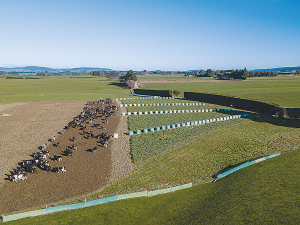Wired for Science: Understanding the feeding habits of mealybug
Fussy children might be frustrating, but fussy mealybugs could help protect the New Zealand wine industry from grapevine leafroll-associated virus 3.
 A proposal to reduce future international tourism visitor numbers could create problems for agricultural exporters.
A proposal to reduce future international tourism visitor numbers could create problems for agricultural exporters.
The Government’s proposal to reduce future international tourism visitor numbers post Covid-19 to concentrate on higher spending visitors may solve one problem but create others, according to Lincoln University researchers.
Research by Dr Rob Radics, Dr Muhammad Umar, and associate professor Anthony Brien, highlighted that most of our agricultural products delivered fresh to market are transported on passenger planes, and tourists contribute to the cost.
The drop in tourism numbers could push up transport costs to the point some businesses do not export at all and are put out of business.
Their work showed that before Covid-19 hit, there were 550 international flights into and out of New Zealand each week, which carried 80% of New Zealand’s overall export airfreight in their belly-holds, and that it was worth $10.8 billion in December 2019.
Only 20% of New Zealand’s airfreight was carried by dedicated air cargo-only freighters.
Before Covid-19, air freight was less than 1% of New Zealand’s total trade by volume, but about 16% in terms of dollar value.
The report raised that the decision may only show a lack of understanding of the inter-relatedness of industries.
“What Covid-19 has highlighted is the not previously considered symbiotic relationship of some sectors of the New Zealand agriculture industry and tourism.”
Transport costs have already gone up because of reduced flights, as in March 2020, Covid-19 bought tourism to a halt and reduced airfreight capacity.
This resulted in an immediate increase in competition for freight space and the Government stepped in to fund additional dedicated airfreight cargo flights to ensure the export of perishable products.
It initially funded 53 weekly flights to key export markets. By November 2020, airfreight flights (dedicated cargo and empty-of-passenger flights) has increased to 120 per week; however, export freight costs also increased as producers competed for space on flights.
The top product categories transported by planes are fish and crustaceans, followed by meat, fruit, dairy produce, and vegetables.
“The general seafood industry consensus is that once the government IAFCS (funding) stops, some presently exported products will be priced out of the export market resulting in some business significantly reducing production or going out of production completely. A similar outcome would exist should flights be reduced as part of a strategic tourist reduction.”
The research report also stated the Government had not signalled how it would achieve the tourism re-think aimed at targeting high-value tourists and the subsequent restriction of people coming to New Zealand.
“Further, there has not been any discussions with major air freight agri-fresh export companies about any impact this may have on their products.”
It also said the aid to exporters itself had issues.
“Long-term it could be said to be a form of subsidy and a breach of Free Trade Agreements. Further, the government assistance is helping only one sector of the countries exporters, a bias, and the assistance cannot continue indefinitely.”
While it saw the effects as unintentional from the Government, it stated reducing passenger flights would lower export volumes, increase costs, and reduce New Zealand’s competitiveness.
It rejected increasing dedicated air-cargo freighters, to fill the reduced passenger flight gap.
“While this is a possibility, the seasonal nature of the four products used in this research, which are significant airfreight users, would present issues for a consistent and sustainable air cargo service – yet another supply chain challenge.”
In addition, increasing cargo-only flights to compensate for a reduction in passenger flights would not reduce the global issues of increasing CO2 from aircraft.
“Therefore, for New Zealand going forward, it must balance its desire to maintain and increase its exportable perishable agri-fresh products, its desire for sustainable tourism, and its consideration of global emissions, all while not breaching any Trade Agreements. Such challenges need constant attention by all actors in the overall supply chain.”
The Meat Industry Association of New Zealand (MIA) today announced that Chief Executive Officer Sirma Karapeeva has resigned from the role.
The winners of the 2026 Hawke’s Bay/Wairarapa Dairy Industry Awards were announced at the annual awards dinner held at Copthorne Solway Park in Masterton on Thursday evening.
Environment Southland is welcoming this week’s decision by the Environmental Protection Authority (EPA) to approve the release of Blaptea elguetai, a leaf‑feeding beetle that will help control the highly invasive Chilean flame creeper.
This March, the potato industry is proudly celebrating International Women’s Day on 8 March alongside the International Year of the Woman Farmer, recognising the vital role women play across every part of the sector — from paddocks and packhouses to research, leadership, and innovation.
Fruit trader Seeka posted a record profit and returns to shareholders in 2025.
Recent weather events in the Bay of Plenty, Gisborne/Tairawhiti, and Canterbury have been declared a medium-scale adverse event.

OPINION: A mate of yours truly reckons rural Manawatu families are the latest to suffer under what he calls the…
OPINION: If old Winston Peters thinks building trade relations with new nations, such as India, isn't a necessary investment in…